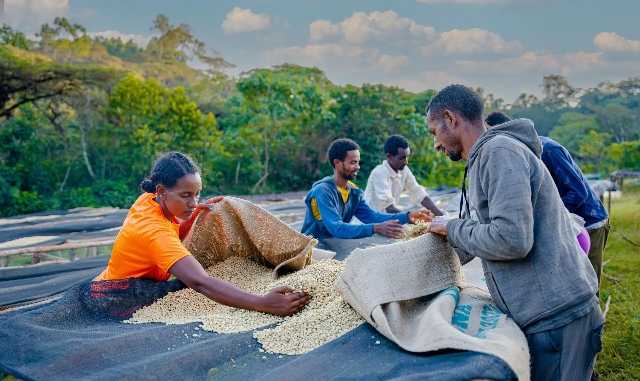ETHIOPIA – Sustainable support for smallholder coffee farming families requires a wide range of activities. Focusing solely on individual issues, such as training in farming methods, is not enough; only a holistic approach that considers and integrates different factors can truly empower smallholder farmers and prepare them for the many challenges they may face, such as changing climatic conditions, price volatility, pests and diseases, or personal crisis.
Program evaluation shows: The holistic project strategy has made CAFE a success. Farmers were trained by use of the farmer field school methodology in good agricultural and climate-smart-practices with a remarkable positive impact on coffee productivity, profitability, and farmers’ resilience to climate change.
By increasing gender equality through couples’ seminars, helping farmer cooperatives to professionalize, supporting youth organizations, and by promoting home gardens and diversified production systems, CAFE has further strengthened smallholder families – thereby securing these gains.
Facts
From October 2019 to December 2024, the Hanns R. Neumann Stiftung implemented a project for +3,000 coffee farming households in Amhara, Ethiopia, benefiting 15,000 people by enhancing holistic solutions.
Funded by the Austrian Development Agency and International Coffee Partners (ICP), the project partners with the Ethiopian Coffee and Tea Authority, the Ministry of Agriculture and Natural Resources, Amhara National Regional State agencies, University of Bahir Dar and Jimma Coffee Research Institute.
Main Program Interventions
The project focused on enhancing farmers’ livelihoods by:
- promoting the professionalization of farmers’ cooperatives and union,
- providing training to farmers through farmer field schools to increase their adoption of good agricultural practices (GAPs) and to diversify their production systems,
- promoting gender equality through couples’ seminars, encouraging a more equitable and efficient use of the available resources, and supporting youth income generation along the coffee chain
“We are very pleased with the results of the project: Despite shocks such as worsening climatic conditions and the emerging Amhara conflict, agricultural productivity and profitability, income diversification, and gender equality have improved, and with them farmers’ livelihoods.” Kirsten Ehrich (Monitoring, Evaluation and Learning Manager at HRNS).
Main findings
Farmer field schools trained farmers in good agricultural and climate-smart practices, which they increasingly adopted.
As a result, smallholder coffee productivity has increased significantly and farmers have become more resilient to climate change (particularly through proper management of shade trees).
This also improved coffee profitability over the course of the project, partly due to higher coffee prices, but mainly due to the increased adoption of GAPs.
Farmers have diversified their production systems and planted more vegetable gardens for home consumption during the project.
Through couples’ seminars, the project has been able to increase joint decision-making about the practices adopted.
All participating cooperatives as well as the Amhara Coffee Farmers Cooperatives Union (ACFCU) have made progress in their professionalization.
At the end of the project, nine out of ten cooperatives were in the consolidation phase and one could be classified as strong and professional. The project contributed to further reducing poverty and food insecurity.
Holistic approach
A particularly successful feature of the project was its holistic strategy following the ICP Theory of Change. Such a strategy goes beyond focusing on single aspects and integrates a wide range of activities into a comprehensive picture.
While agricultural expertise is an important foundation for successful smallholder projects, evaluation has shown that in order to maintain a high level of livelihoods for smallholder farmers in the long term, it is important to go beyond providing training in agricultural practices and also include other activities, particularly in the areas of gender equality, income diversification, climate resilience, and farmer organization.
For more info click here.















